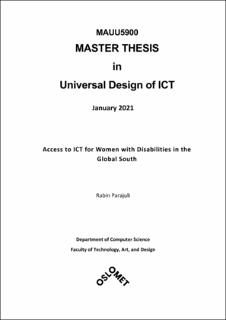Access to ICT for women with disabilities in the global south.
Master thesis
Published version
Permanent lenke
https://hdl.handle.net/11250/2756621Utgivelsesdato
2020Metadata
Vis full innførselSamlinger
Sammendrag
Even though ICTs hold great potential in transforming society and a country economically, most women and women with disabilities are far from accessing ICT. The thesis findings result from in-depth interviews with a total of 12 participants: 2 women without disabilities, 5 men with disabilities, and 5 women with disabilities.
This study aims to understand the barriers and challenges that women with disabilities encounter while accessing ICT in Mozambique. The research is a comparative study between women with disabilities, women without disabilities, and men with disabilities. This thesis adopts qualitative methods and in-depth interviews for data collection. The data collected were then analyzed using thematic analysis.
The analysis from the qualitative study found that women with disabilities are more likely to face ICT barriers compared to other remaining groups. These were due to various reasons, such as lack of ICT training, knowledge, education, social discrimination, family responsibilities, poor design of ICT, gender disparity, not giving priority to disabilities, not following WCAG guidelines, and relatively high cost of ICT. The findings are supported by the data collected from in-depth interviews with 3 groups. Consequently, this study also proposed possible recommendations and solutions to combat the barriers.
keywords: ICTs, technology, disabilities, women with disabilities, men with disabilities, women, gender, accessibility, Mozambique
